Relay, an experimental series of exhibitions presenting five artists in five different installations over five weeks, is an ambitious undertaking for Hera, a small membership-based non-profit gallery in southern Rhode Island. With a focus on process, ephemeralness of materials and interaction with the surrounding space, Hera, under gallery director and curator Abigail McGuire’s direction managed to bring together a noteworthy set of artists with diverging propositions that encompassed video, performance and installation: Mary Kudlak, David Namhon Kim, Jennifer Avery, Max Van Pelt, and McGuire herself.
Max Van Pelt, Relay’s final artist, whose opening reception also marked the end of the exhibition series, managed to transform the narrow, rectangular project space into his own private playground of experimentation with gravity and abstract mind-mapping. Using steel, yarn, wood, plastic, twine, wire and plexiglass, Van Pelt’s installations are quite literally a balancing act between sculpture and drawing. Sculptural materials are inserted into the formal language of drawing and deployed to make fluid marks in response to the gallery setting—a carpeted, once-upon-a-time office space.
Tiny sculptural elements like polished steel hooks and wire form anchors in the wall and connecting points for lines made of twine and thread cast in space. There were several smaller self-contained networks extending from corners or sections of wall, as well as one large drawing that spanned the whole length of the gallery. This process-based spatial mark making practice is a departure for Van Pelt, having previously engaged with the two disciplines in a more self-contained and, perhaps, conservative way. Taking a risk has paid off: the work feels open, light, and positively incomplete.
But don’t let this feeling of effortlessness fool you—every element in Van Pelt’s installation is meticulously crafted and placed within the larger whole with utmost intention and purpose. His elements, or marks as he calls them, are welded, grinded, polished and partially tied with thread using fly fishing techniques, before they are inserted into the wall as connectors for the rhizomatic network of thread extending outwards. There isn’t a single screw of drop of glue in the work—everything is held together solely by tension. It’s a painstakingly slow process of physically and sculpturally balancing the different parts of his drawing in space, somewhat at odds with the fast gestures and suggested ease of Van Pelt’s mark making.
Van Pelt’s attention to detail extends from the formal language of his marks to the materials and colors used. Shadows in general, and the fractured shadows cast by plexiglass rod, in particular, are as important to creating the internal tension at the heart of the installation as the color of twine used, ranging from vibrant green and orange to fluorescent yellow and pink. Color is applied purposefully, as high notes within the overall composition.
His attention to detail was also present in the handcrafted display table, on which he displayed a selection of his nodal elements neatly organized into compartments offering the viewer a glimpse of his meticulous process. Ordered according to their own internal logic—be it size, material, color or strength—they appeared as modernist building blocks for an architectural model, or the precious contents of a jewellery case.
Reminiscent of Sara Sze’s site-specific installations, Van Pelt’s work makes use of unexpected and carefully arranged combinations of humble everyday materials, of light, air and movement coupled with an intuitive understanding of color and texture. Following a post-minimalist trajectory, he is motivated by the creation of a language of abstraction to realize meaning through process and a formalist engagement with the surrounding space. His gravity-defying, intricate constructions solicit a new experience of space, disorienting and reorienting the viewer at every turn.
Van Pelt’s installations insist you leave the noise of the outside behind upon entering the gallery. The reward goes beyond the instant gratification of a potentially larger or louder work: his delicate and quiet gestures generate a refreshing stillness, and mindfulness born from their weightlessness and sincerity.
Max Van Pelt's Relay 5 at Hera Gallery was on view from July 20-25.
- Max Van Pelt
- Max Van Pelt
- Max Van Pelt
- Max Van Pelt

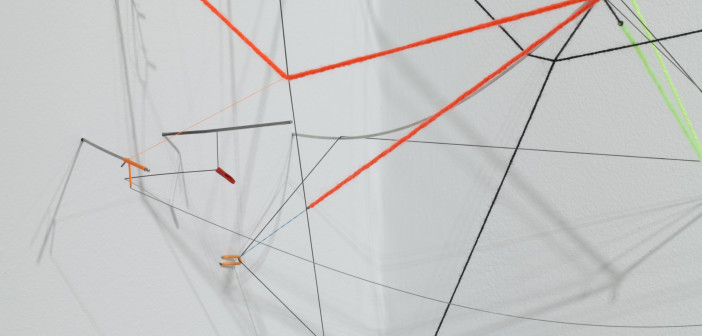
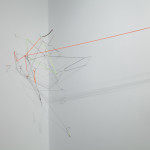
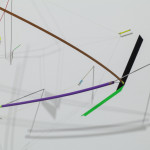
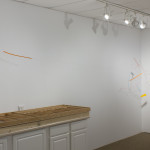
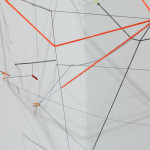
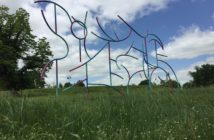
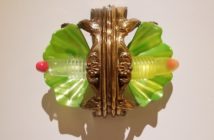
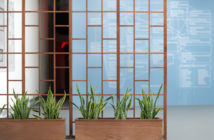
1 Comment
Pingback: Not Gone… But a bit Overloaded | According to Abigael